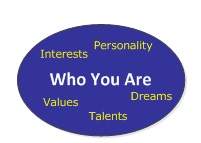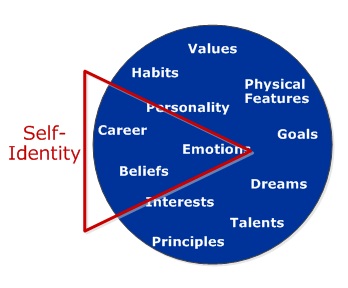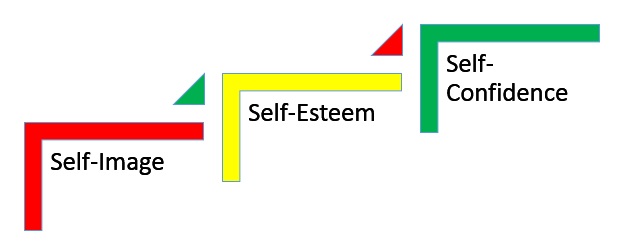Self Concepts and Self Constructs
We divided and grouped the term and concept of “self” into several categories. The intent of these sections is not to define these terms in their exact the definitions described by psychologist or sociologists, rather it is to help you understand what we are referring to and how to improve that aspect of your life.
Elements of Self Concepts and Self Constructs
Self-Identity
Self-Image
Self-esteem
Self-Confidence
Self-efficacy
Self-Concepts
Self-Constructs
Self Concepts and Self Constructs Defined
Self-Concepts
Self-concept is the perception you have of yourself and your relation to others. It can be viewed as who you are and how you believe you fit into the world around you. Self-concept is derived from self-esteem and self-efficacy. It stems from how value you feel to others and have strong you believe in your ability to accomplish your goals. Your perception of yourself may distorted based on your self-esteem. Therefore, you may see yourself different from the way other see you.
Some aspects of the self-concept may be purely factual statements such as “I am a college graduate” or “I can play basketball” without any assessment or judgment of whether it is good or bad. Other aspects may be based simply on personal feelings (e.g. “I am very smart” or “I am an excellent pianist”).
Self-Constructs
Self-constructs are the collection of the thoughts, feeling and perceptions you have created about yourself. It includes your self-image, self-identity, self-esteem, self-confidence, and self-efficacy. It is basically a collection of who you believe you are.
Self-Identity
Self-Identity is your perception of specific and selective traits and characteristics that represent you. As an individual you possess numerous physical attributes, internal characteristics, roles, and external connections which make up your personal identity. It is specifically selected traits, abilities, interests, and/or roles from your personal identity that you create you self-identity.
Your self-identity may be strongly tied to just a single or a few parts of your personal identity. Some people firmly tie their self-identity to their occupation, and if they lose their job, they often will struggle with finding their self-identity.
Self-Image
Self-Image is how you view yourself and what you think about yourself. It is what you “see” in yourself and/or imagine what others see in you. It is strongly tied to emotion and has a tendency to be judgmental. You may perceive yourself as unintelligent, overweight, and unattractive, while other see you as funny and attractive. Self-image directly influences self-esteem.
Self-Esteem
Self-Esteem is your opinion of your worth to others and the world. Is it your perception of your value to the world and how valuable you feel you are to others. It is stems from self-image. It is an assessment of value based on your self-image. If you see yourself in a positive way with good qualities, characteristics, and abilities, you probably have high self-esteem or self-worth. However, if you see yourself in a negative way, having few good qualities, traits, or abilities, you most often will have low self-esteem.
Self-Confidence
Self-confidence is trust in yourself and in your abilities and aptitude. Having a lot of self-confidence means that you trust yourself, and that you have a positive opinion about yourself, you believe you can do things well. Self-confidence is connected to both self-image and self-esteem. By first assessing, then improving your self-image, you can improve your self-esteem. By improving your self-esteem, you build self-confidence. High self-confidence can lead to personal achievement which in turn can improve your self-image and self-esteem.
Self-Efficacy
Self-efficacy is the belief that you have about your capability to perform the action required to manage specific situations or produce a certain result. It essentially means that you have a lot of faith in your ability to produce a desired outcome. Simply put, it is believing you can successfully perform specific tasks.
Self-confidence refers to a general strength of belief, but does not necessarily specify what the certainty is about. Self-efficacy, on the other hand, can be defined as the capability to attain the required outcome based on a specific performance. You may have a lot of self-confidence, but not have self-efficacy to make a free throw at the end of a basketball game.
Self-efficacy can be distinguished from self-esteem in that self-esteem is a perpetual internal feeling while self-efficacy is a belief that depends upon the performance of a specific task.
Self Concepts and Self Constructs
Coin Analogy
To help differentiate between the various “self” constructs the following analogy is used. This is an example of how a coin may depict or assess its “self.”
Self-Identity – How the coin identifies itself. I am a 124 year old rare Greek coin in excellent condition.
Self-Image – How the coin may view itself. It may use various adjectives such as old, shiny, round, heavy, scratches, worn, silver, copper, etc…
Self-esteem – Its opinion of its own value or worth. The coin may feel it is worth a dollar amount such as $5 or $100. On the other hand, it may feel it is worth a value in trade such as two loaves of bread or as much as an automobile.
Self-Confidence – How it feels about its abilities. It may feel good about it ability to be used for currency, to maintain it shape, to avoid being tarnished, resist scratches, etc…
Self-efficacy – It is its belief in its capability to perform a specific action. The coin may believe it can easily maintain its shape in temperatures around 100 degrees.
Self-Concepts – How the coins sees itself in relation to world. It may see itself as a rare coin, it may compare itself to paper currency, it may reflect on its value versus bartering for goods, or it may ponder its future value in the changing world.
Self-Constructs – It is a collection of beliefs and perceptions it has about itself. The constructs would include its identity, image, esteem, confidence, efficacy, etc…





